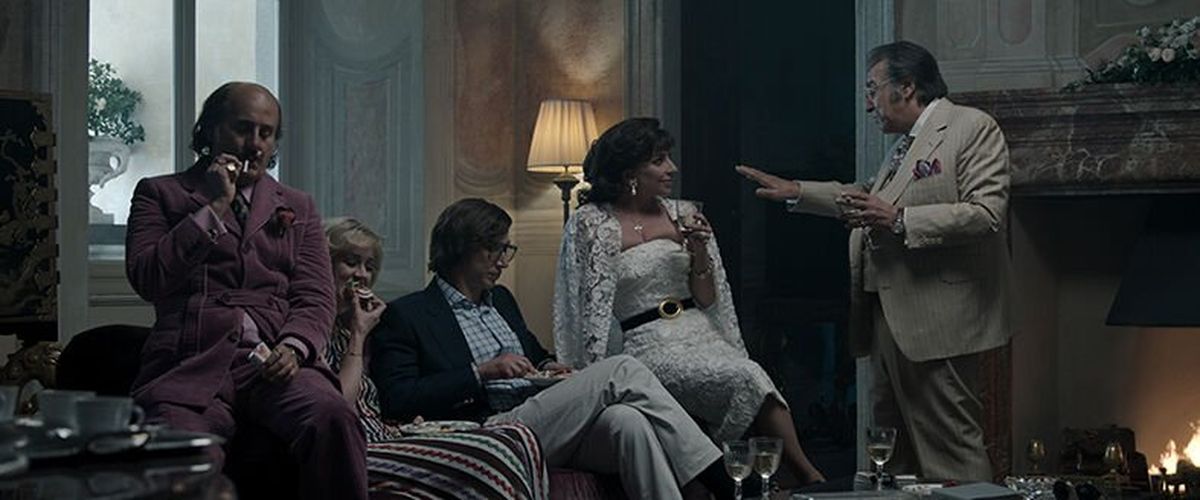Review: Fashionable drama ‘House of Gucci’ goes to great lengths to do not very much at all

“House of Gucci” is a movie about passion, not fashion. The soap operalike tale, which tells the true story of the 1995 murder of fashion heir Maurizio Gucci by thugs hired by his ex-wife Patrizia Reggiani, is also – if you believe the trailer, which touts the following themes, in all caps – about money, family, power, betrayal, sex, loyalty, scandal, ambition and murder.
Presumably, all that content explains why the film needs to be 2 hours and 37 minutes. By comparison, “Dune” – which is only a saga of the rise of a psychic space Messiah destined to lead a race of oppressed hallucinogenic-drug miners to freedom on a desert planet overrun by giant, industrial-machinery-eating sandworms – somehow manages to be 2 minutes shorter.
The new film doesn’t even get to the divorce or the murder until after 2 hours, which is well beyond the point at which a lot of very fine movies have already rolled their closing credits. So what does “Gucci” do with all that precious time? Not much, as it turns out.
Directed by Ridley Scott, it’s one of those prestige true-crime dramas that – unlike the director’s thematically similar, yet deliciously, darkly cynical “All the Money in the World,” about the 1973 kidnapping of John Paul Getty III – run through a checklist of events without ever seeming to draw any cautionary lesson or larger point. None of which would be a problem if “Gucci” were half as much fun as I’m about to make it sound. After all, who doesn’t love a good, tawdry scandal?
On paper, at least, the facts have the makings of make an entertaining, if campy yarn. Based on Sara Gay Forden’s 2000 nonfiction book, the film follows the relationship between wealthy Gucci scion Maurizio (Adam Driver), a nerdy law student who, as the film opens in 1978, seems to have little interest in pursuing the family business, and Patrizia (Lady Gaga), a woman of modest means who’s working for her father’s trucking company.
“Mafia!,” snorts Maurizio’s father Rodolfo (Jeremy Irons) dismissively, before briefly disinheriting his son. Patrizia comes across like a bit of a golddigger. Her eyes light up at the name Gucci when she and Maurizio first meet, and then she seems to be stalking him. Once things turn sour, she seeks the advice of a TV psychic (Salma Hayek), who becomes an accessory to the film’s climactic crime.
The rest of the story concerns the ups and downs of their marriage set against a backdrop of the Gucci empire’s business dealings: Charges of tax fraud are brought against Rodolfo’s brother Aldo (Al Pacino), instigated by his ne’er-do-well, would-be designer son Paolo (Jared Leto), against whom countercharges of copyright infringement are brought.
“I don’t need anyone,” Paolo declaims in one of several lines destined to find their way to a midnight quote-along screening of the film. “I’m Paolo – Paolo Gucci! And I’m going to start my own line.” This short speech is followed by a shot of Paolo urinating on a vintage, Gucci-logo scarf designed by his Uncle Rodolfo.
At another point, the ambitious Patrizia says, with the menace – and heavy, vaguely Eastern European accent – of a Countess Dracula, “It’s time to take out the trash.” Good stuff. Except, not really. (I’ll admit the costumes are kind of fabulous.)
Speaking of accents: The Italian-inflected English dialogue (by Becky Johnston and Robert Bentivegna) is all over the map. Pacino sounds like his character grew up in the Bronx section of Florence. Irons struggles to shake off the Old Vic. And Driver doesn’t really try much at all.
Leto, for his part sounds (and even looks) a little like Mario of the video game. The actor is unrecognizable under a bald cap, mustache and bushy sideburns that look like a family of woolly bear caterpillars have colonized his head, a paunchy fat suit and pudgy facial prosthetics. But wouldn’t it have been simpler to just cast someone who already looks like that?
Apologies for making any of this sound like “Gucci” could be one of those so-bad-it’s-good larks. For all its imperfections, the sin this movie is most guilty of is taking itself too seriously. As a colleague observed after a recent screening, the film would have been a lot more fun if Adam McKay had directed it.
“I need an espresso,” sighs Maurizio, encountering one of the plot’s parade of pointless headaches. So might you, dear reader, but I wouldn’t recommend consuming one before the movie. Not without a bathroom break.